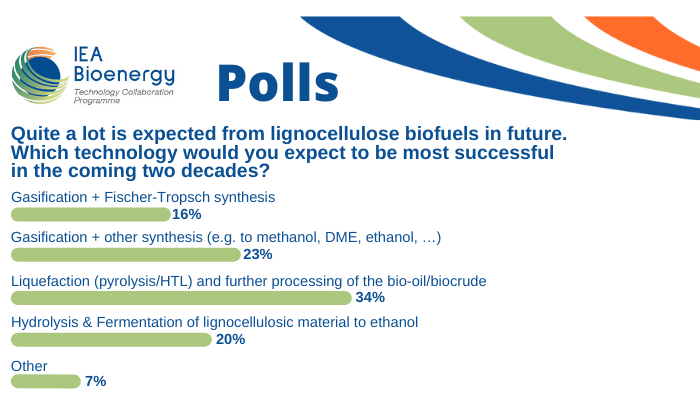There is an urgent need to reduce the GHG emissions of the transport sector which is heavily dependent on fossil fuels, particularly oil. Although the increasing use of biofuels such as ethanol and biodiesel was initially driven by energy security concerns (part of reason why the IEA was initially formed in response to the “oil-crisis” of the 1970’s) the ability of these fuels to reduce the carbon intensity of transportation is of increasing interest.
This has been recognised by jurisdiction such as California and British Columbia, where policies such as the low carbon fuels standard (LCFS) have encouraged the production and use of lower carbon intensive fuels such as renewable diesel. These polices have also encouraged the oil refining sector to decarbonise, by either “repurposing” refineries to biorefineries that use lipid/oleochemical feedstocks, as demonstrated by World Energy and Neste, or to adopt a co-processing strategy, as demonstrated by BP and Preem.
This session profiled some of the companies who have adopted these strategies, the policies that have motivated them and the use of life-cycle-analysis (LCA) to assess the carbon intensity of the final fuels.
Moderator
Jim McMillan, Principal Engineer | Catalytic Carbon Transformation and Scale-up Center, National Renewable Energy Laboratory (NREL), United States
Presentations
Progress towards biofuels for marine shipping: status and identification of barriers for utilization of advanced biofuels in the marine sector ![]()
Sune Tjalfe Thomsen, Assistant professor Forest, Nature and Biomass, University of Copenhagen, Denmark
Advanced biofuels from fast pyrolysis bio-oil ![]()
Tijs Lammens, Senior Process Engineer, BTG Bioliquids, The Netherlands
Emerging biofuels markets – South America ![]()
Glaucia Mendes Souza, Full Professor at the Institute of Chemistry, President of the FAPESP Bioenergy Research Program, University of São Paulo, Brazil
The importance of certification in the development of biofuels markets ![]()
Paul Sinnige, Senior Advisor biofuels and bioenergy, NL Enterprise Agency (RVO), The Netherlands
José Muisers, Advisor Sustainable Energy, NL Enterprise Agency (RVO), The Netherlands
Life Cycle Analysis (LCA) and its increasing importance in quantifying the carbon intensity of transportation fuels ![]()
Don O’Connor, President, S&T2 Consultants Inc, Canada

Highlights
- Biofuels are highly promising for the marine sector, both for reducing its carbon footprint and for meeting more stringent sulphur regulations. While several actors show high ambitions, the main barriers for deployment are (1) uncertainty on sustainability requirements (what feedstock is acceptable?), (2) incompatibility with international marine fuel standards, and (3) lack of economic incentives and targeted policies. International policies targeting alternative fuel technologies more directly such as carbon taxation or renewable fuel mandates could significantly accelerate the transition from fossil to alternative fuels.
- Fast pyrolysis of biomass close to the feedstock source and transporting the bio-oil for more central processing is a promising concept. Co-processing biocrude/bio-oil in existing petroleum refineries can provide an efficient way to immediately reduce the carbon footprint of transport fuels that are brought to the market. With further phase-down of fossil fuels, dedicated refining of the bio-oil will be required.
- In several emerging economies in Latin America and Sub-Saharan Africa there are ample opportunities to expand land use (including land restoration) for biomass production, without compromising food provision or high biodiverse/carbon stock areas. High yields are particularly possible in tropical and sub-tropical areas.
- Ethanol already represents the major fuel in the flex fuel car fleet in Brazil, both in pure (hydrous) form in and in a 27% blend with gasoline.The current Brazilian Policy for Biofuels – RenovaBio rewards biofuels with low carbon intensity.
- With mandates shifting from volume mandates to GHG emission reduction mandates (e.g., in California, Brazil, Germany, Sweden, …) and putting a price on carbon, LCA becomes a critical tool. Nevertheless, LCA tools were not originally designed as compliance tools and results largely depend on the quality of the data used. Particularly for secondary data (not under control of the producer, e.g., in terms of feedstocks) this is a challenge. There needs to be a continual effort to update these secondary data sets if we want credible LCAs.
- Certification of feedstocks and biofuel pathways can serve to monitor compliance for a policy framework, manage the Chain of Custody (CoC), and ensure good traceability and transfer of data. Data availability and correctness is key. A wide range of approved private certification schemes underlines the importance of a clear policy framework for those countries where certification plays a role in co-regulation. Different requirements from different countries/regions (also due to different scopes) have resulted in the development of specific modules under certification schemes, to be able to adapt to specific policy frameworks. Aligning requirements between different regions or at international level is highly recommended for good market operation.

Recording


